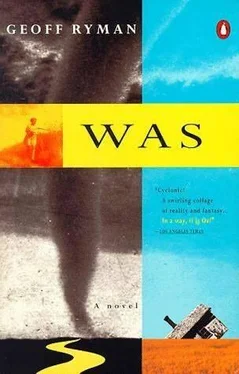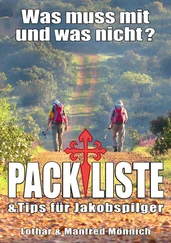"Okay, we'll do what we can for ya," said one of the women at the desks. She was about Jonathan's age, well groomed, bronzed hair cut short and swept up. Her name was Sally, and she invited Jonathan into the tiny back rooms where records were kept. The first small room was lined with shelves on which thick volumes lay flat.
"How long ago ya talking about?" Sally asked him.
"Eighteen seventies."
That did not surprise her. "Uh-huh. Do you know what section or range the people lived in? Township would help."
Jonathan didn't. He gave her the names, spelled them for her. G… A… E… L. Branscomb. Sally wrote on the sloping surface of a kind of house for records that stood in the middle of the room. Jonathan looked at the walls, at the books. Mortgage Record, Riley County, 217 . Record of Military Discharge 3.
More huge books lay suspended under the roof of the little house. On the walls were maps, in colored sections.
"Now," said Sally. "Let me show you what the problem is." She led him to one of the maps and pointed with perfect, frosted fingernails. There was the Kansas River. There was the land, divided into squares which were divided into further squares.
"If you knew the township, we could then start to look for what sector they lived on. You see, when the land was settled, each township and range was divided up into these sectors. And each sector was divided up into quarters, Northwest quarter, Northeast quarter. Sometimes they were divided up even further."
Sally turned and reached under the roof, and with a grunt pulled out one of the huge books. Laid open, it consisted of a page to each half sector. Names and dates were written in lines.
"This tells us who had what sector when and how it changed hands," she said.
Jonathan read:
4-1-72 / Webster J.M. to Louise R.B. Rowe / Book B / page 308
"That tells us where to find the deed on microfilm. And that can tell us all kinds of stuff."
Jonathan scanned the page. "But I've got to know where I'm looking first."
"Yup," she said with a sigh.
The dates were out of order. The land seemed to change hands every two years.
"You can see how tough things were for them," said Sally. "They mortgaged the land, then sold some of it off, then bought it back, then mortgaged it again. It sure gets confusing. The deeds are great; you find out that someone couldn't pay his taxes, or someone else has been jailed."
Jonathan looked up. "That must be great."
"Oh, listen, the stuff you find out," she agreed.
Jonathan paused for thought. "How about school records?" he asked.
"Hundreds. Thousands. But same problem again, we got 'em for the whole county. I can show you."
She led him into a second room, even smaller. Jonathan suddenly saw it had a metal door. It was a safe.
Another grunt and a groan and another huge, beautiful book in leather with marbled endpapers was laid open. A sticker said: Grant and Burgess, Blank Book Manufacturers, Topeka, Kansas.
There were hundreds of schools, recorded by number, and lists of schoolteachers for each year and how much they were paid, fifty dollars a month. Jonathan looked at the tidy, scratchy handwriting done in nibbed pen. The ink had turned orange with age.
"And up there," said Sally, pointing. Along the top of the shelves ran a line of blue-bound papers. "We have everybody's school reports. I even found some of mine up there. And my mother's. But we do not have much before 1903. You see, before the levee was built, we used to have real bad floods, and almost everything was lost in the 1903 flood." She shrugged and held up her hands. "We might have some older records down in the basement."
"I've got to know where she was," said Jonathan.
"Unless you want to look through everything for the whole county. Got a month or two?"
Jonathan stood, eyes closed, thinking. "Do you keep the census records too?"
"Good," said Sally and pointed at him. She had a hunter's look as well. "But we don't have those. Hold on a sec." She leaned into the outer office. "Betty? Sorry, excuse me. Where would census records be for the 1870s?"
"Oh," said her boss, coming in, a hand lightly across her forehead. Her boss wore a suit, blue jacket, blue skirt, blue ruffled shirt. "Let me think." She looked concerned, helpful. "I think that would be the historical museum."
She even gave Jonathan a slightly better map.
Just inside the door of the Riley County Historical Museum, there was an old ship's bell on a plinth. There were some publications for sale, about the Old West. A pale young man in a nylon shirt with pens in the pocket was stapling papers together by a reception window.
"We'll be closing soon. Can I help you?" he asked.
"I," began Jonathan and found his mind had gone blank for a moment. "I'm doing some research. I'm trying to find a family who lived in this area."
The pale young man sighed. "You've only got half an hour."
"I don't have much time anyway," said Jonathan, hunter's urgency upon him. "Can I start?"
"Okay," nodded the pale young man. "Look, things are a bit of a mess. What do you need?"
Jonathan's mouth hung open. Come on, Jonathan. You have a degree in history. You know how this works.
"I need the census. Do you have a census?"
A wisp of a smile on the pale face. "I'm afraid you'll need to be a bit more specific."
No place like home, Jonathan remembered, Millie Branscomb, aged 8, 1856.
"Eighteen sixties. Eighteen seventies."
"Sure. You might as well come in," said the young man.
There were rooms to the right and left, darkened, full of displays of furniture and clothing and blown-up photographs. Jonathan and the librarian passed beyond those into a large room lined with old bookshelves of varying heights. There were tables littered with books and files. On the walls were giant maps of the county and aerial photographs of the airport. There were filing cabinets, giant staplers and a statue of a Paul Bunyan figure with a scythe instead of an ax.
"Jeannie and I have been trying to file all this stuff," said the young man.
"All what stuff?"
"Oh. Everything," said the young man. "We got all these memoirs to file, old photographs, things like that. Have a seat, I'll find you a copy of the 1875 census. It isn't all that long."
Jonathan sat down, shaking. There was a smell. A smell of pancakes. Very hot, slightly charred. Was that wind stirring his hair?
I am losing my mind, he thought.
Very gently, in the distance, he heard cattle lowing. He wanted to weep, but not from dismay. He wanted to weep from yearning. For grass and huge buttercups and the sound of air moving across distances.
"It was, uh, it was retyped," said the young man.
I'll just look her up. Here. I'll find her. Jonathan held a sheet.
EXPLANATION
In 1875 the townships of Riley County were Ashland, Bala, Grant
That's right, Bill said she didn't live in Manhattan. She lived near it. Where did Bill say?
Madison, Manhattan, May Day, Ogden and Zeandale
None of it rang a bell. There was still the sensation of moving air. Jonathan felt sick. His throat clenched and there was a nasty taste in his mouth.
"This will be fine," he said, his voice clenched. He needed air. "Can you Xerox it for me?"
"We have to charge," said the librarian's assistant.
"Okay. Anything else?"
Dear God, stop me being sick. I can't be sick here.
"Some of those memoirs. One of those memoirs, I can read it tonight." Jonathan clutched his throat. He could feel the ribs of his voice box.
"I need some air. Could I step outside, please, while you Xerox them? I'm terribly sorry. I don't feel well."
He could feel his face coated with sweat as if he had smeared Brylcreem all over it.
The librarian's assistant was concerned. "Listen, give me a couple of minutes and I'll have these ready for you. You step outside, sure."
Читать дальше












